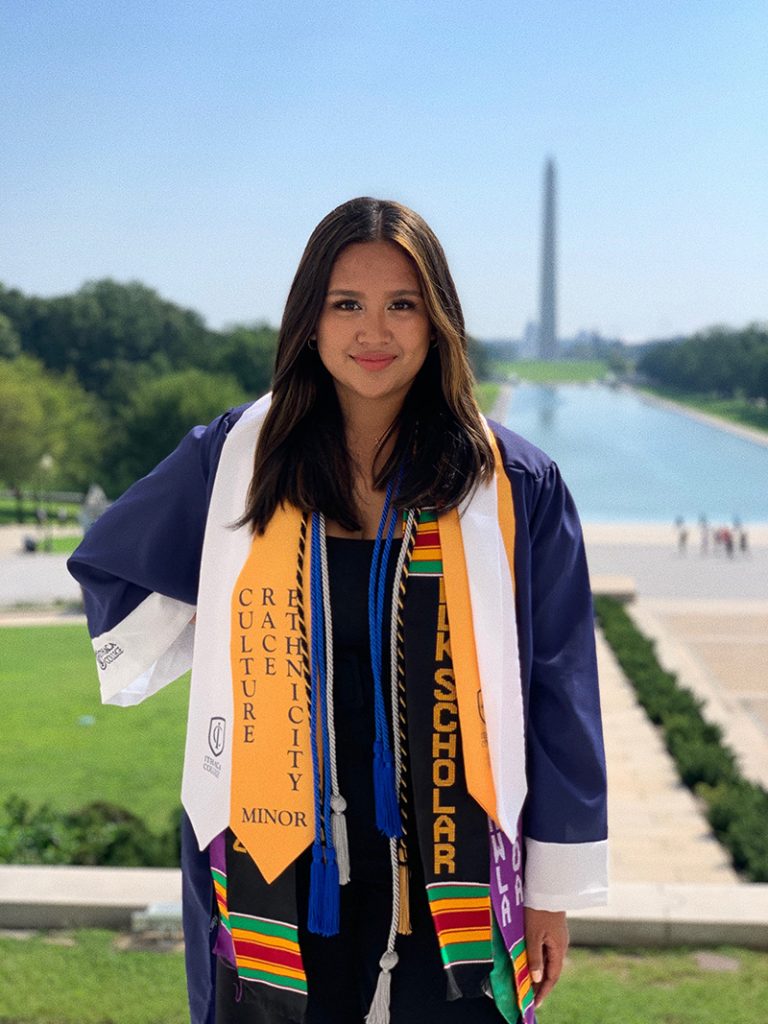Comments from March 2021 Symposium:
When I look back on my college experience, Dr. Barlas holds a huge place in that experience. I have taken 4 courses with her and she advised me for my senior thesis. So, she knows a lot about me, both as a student and a person (and probably more than she would like to know).
I took Politics and Identity, Understanding Islam, Race and Colonialism, and a Seminar on U.S. Empire with Dr. Barlas. Through these classes, I got to know myself very deeply, specifically as a Filipina-Pakistani woman, born and raised in the United States. I always thought that my identities and my cultures were incredibly different. I was Filipina, Pakistani, AND American. But, Dr. Barlas taught me that I was not half or a third of anything. I am whole – I am Filipina-Pakistani-American. She taught me the connections that my identities and my countries have, because of colonialism, imperialism, and white supremacy. Those connections were not always pretty. In fact, they were never really pretty.
In our Seminar on U.S. Empire, I remember crying while reading out to the class an excerpt from How to Hide an Empire by Daniel Immerwhar. It was an excerpt about the Balanghiga Massacre, where the U.S. military ordered to murder any Filipino child older than the age of 10. In my exact province of the Philippines, in the exact streets that I hold some of the most heartfelt memories in. It has brought me immense pain but also immense peace and strength to understand my history in the way that I do now.
A few days after I cried in class, Dr. Barlas encouraged me to read a letter I wrote to my classmates. I read this letter asking my classmates to see me and to see my pain. And they did. Dr. Barlas created a culture in her classrooms of incredible respect and mutual understanding. The pain I felt about my people being massacred, I could feel everyone felt that same pain as well. Her classrooms, and that class in particular, was truly unlike any other space on campus.
Dr. Barlas allowed you to come as you were to class. She didn’t value what she viewed as the “right answer.” What mattered to her was that you challenged yourself – whether you challenged yourself an inch, a mile, or thousands of miles. For me, sometimes it was only an inch and sometimes it was miles. And, she told me the truth, even when I didn’t want to hear it. She told me when to get out of my head or when to push myself a little more. She told me when she expected more from me and she reminded me at times when I most needed it, that I was capable of more.
Now, as I am navigating out the world as a new graduate – thinking about where I belong or what I should dedicate my life to – I am constantly thinking about where my place is. I am the colonized and the colonizer. How do I navigate that? But, Dr. Barlas taught me that who I am will never fit into neat boxes as I would like it to. These complexities of race, colonialism, power, identity may never be solved and it is okay to be in the middle. It’s okay to not have a place amongst all these complexities.
Recently, I find myself being in conversations about race, colonialism, politics, and power with friends, a lot of whom were also in Dr. Barlas’ class. We’ll find ourselves giggling saying “this sounds like something Dr. Barlas would say” or “I feel like we’re in Dr. Barlas’ class” or “we should hit up some of our classmates and see if they want to talk about this.”
Overall, Dr. Barlas has represented and meant a lot to me personally as a Pakistani woman. I had never had a Pakistani teacher or professor before her, and I really didn’t have a connection with a strong Pakistani woman at all before. I don’t have any family on my Pakistani side in the United States and although we do visit often, my grandmother does not speak English and my Urdu and Punjabi abilities are unfortunately just not enough. So, that connection has always been painfully difficult to foster. So, I am just incredibly thankful to have had Dr. Barlas in those really formative four years in my life to show me in a really special way what it means to be a strong, critical, and proud Pakistani woman. I will forever be thankful for that.
Thank you, Dr. Barlas.
